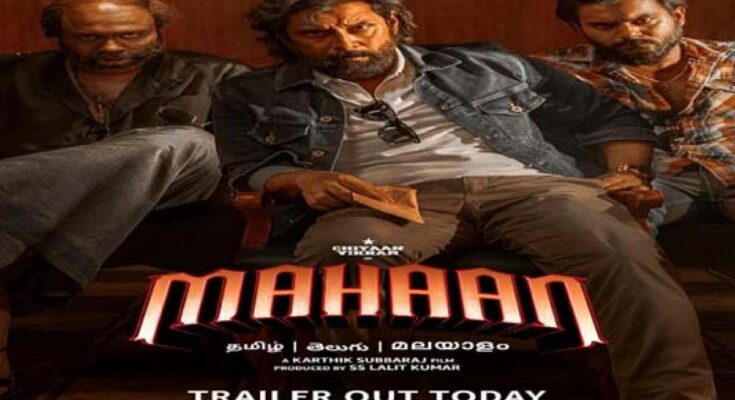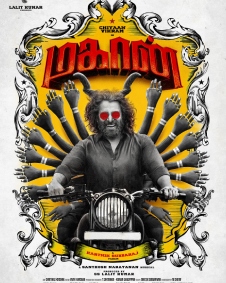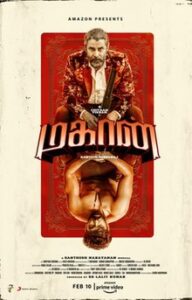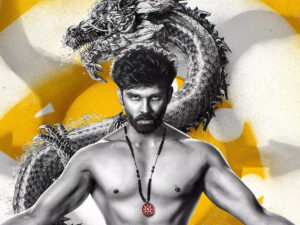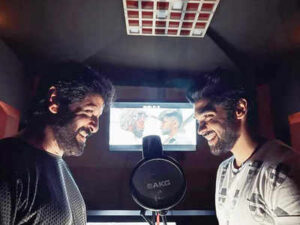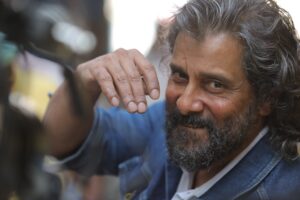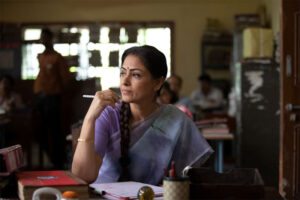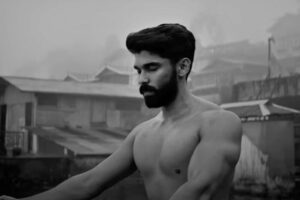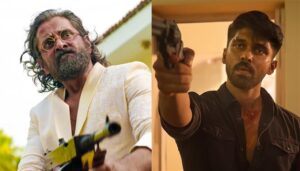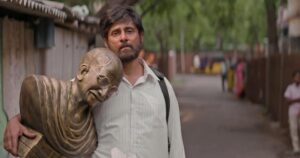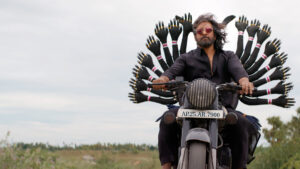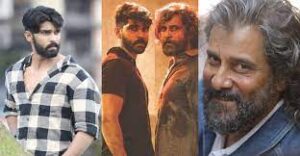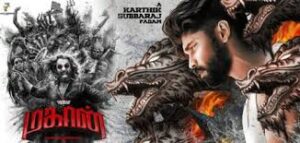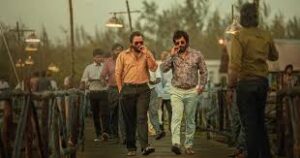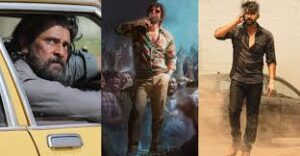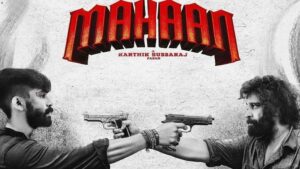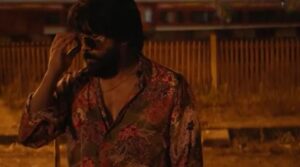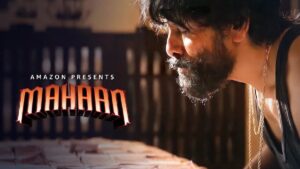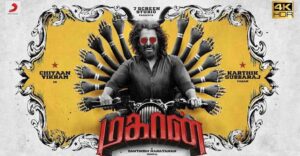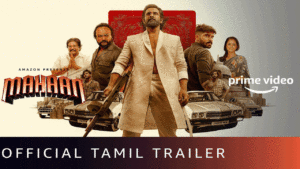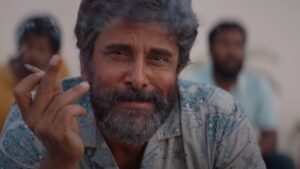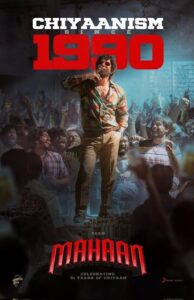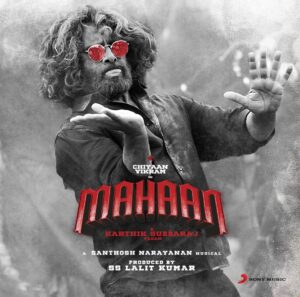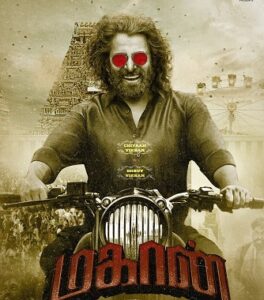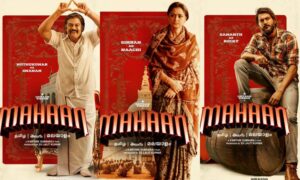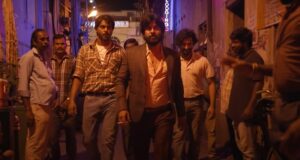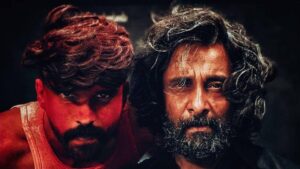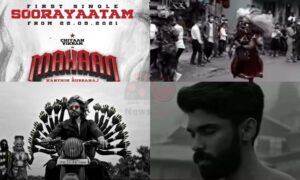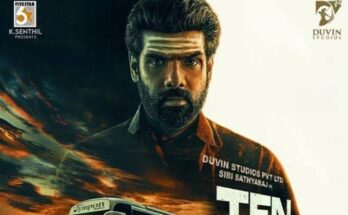Mahaan Tamil Move Review
Cast-;
Vikram , Raghavan , Dhruv Vikram , Akshath Das , Simran , Bobby Simha , Sananth , Vettai Muthukumar , Deepa k Paramesh , Aadukalam Naren ,Gajaraj , Vani Bhojan and others .
Crew-;
Director : Karthik Subbaraj ,Music : Santhosh Narayanan , Producer ; SS Lalit Kumar , DOP : Shreyaas Krishna ,
Editor : Vivek Harshan ,Production Designer : T Santanam, Kumar Gangappan , Stunts : Dinesh Subbarayan ,
Choreography : M Sherif , Sound Designer : Kunal Rajan , Sound Mix : Suren G , Costume designer : Praveen Raja ,Makeup : Vinoth S , Special effects Makeup : Baldev (TOM) , Costumer : Subier , Colorist : Suresh Ravi , Lyrics : Vivek, Muthamil RMS, Asal Kolar, Dhruv Vikram, Durai , Stills : M Dinesh , VFX : Monesh , Design : Tuney John(24 AM) , Production Executive : RS Venkat, D Nirmal Kannan , Executive Producer : Ashok Narayanan , Direction tea m : Srinivasan, Karthik VP, Dhakshi, Shylam, Vigneswaran, Jagadish, Arvind Raju, Mahes Balu, Sooraj, Sai, Muruga nantham , P R O : Yuvaaraj and others .
Story-;
The film opens up in 1968 where Mohandoss is leading a rebellion against the production of liquor in the state of Tamil Nadu. On the other hand, young Gandhi Mahaan is playing rummy with his friends and in that game him an d his friends get into a fight causing all 3 of them to have scars on their face. Mohandoss finding out about Gand hi playing rummy and drinking alcohol he decides to teach him a lesson and he makes Gandhi vow that he will li ve like a Mahaan and that he will lead the liquor ban movement when he is older. The story then shifts to 1996, where a 40 year old Gandhi is a commerce teacher at the local government school and has a wife, Nachi, and a so n, Dada. Gandhi on his birthday goes to a temple and he meets a beggar that says that Gandhi lives life like the 95% of people and that he will never live like the 5% that have no morals or principles in life. That same night Ga ndhi thinks about what the beggar told him about and Nachi tells him that her and her friends are going on a trip to Tirupati so she will be gone the whole day.
Gandhi uses this as an opportunity to live life to the fullest and he goes to a bar to drink and smoke. Here he me ets one of his old students, Rocky, and Rocky decides to help Gandhi live his dreams during that day. Gandhi is then taken to Rocky’s father, Sathyavan, where Gandhi plays rummy and wins a lot of money. Sathya then is able to recognize Gandhi as his childhood friend because of the scar on his face and both embrace. The next morning, Gandhi goes back home to see Nachi and her family crying since Gandhi went missing. Nachi then deduces that Gandhi drank and leaves him taking Dada with her since Gandhi broke the rule of never drinking. Gandhi goes to Nachi’s house to get her back but he gets ousted. He then decides to go live with Sathya and Rocky and they all come up with selling the liquor that Sathya’s father made and naming the brand Soora. Time passes by and in 1998, Gandhi, Sathya, and Rocky are all rich from selling the drink and they plan to start a syndicate where only their drink could be sold in the bars in Tamil Nadu.
One of the members opposes and this leads to them getting attacked by them but Gandhi fights all of them off. This incident causes Sathya to become super religious and it causes Sathya to get paranoid and he suggests that they stop selling liquor. Time passes by and in 2003 they are all super influential in society. However at the same time, Tamil Nadu announces that only approved liquor is allowed to be sold in bars and so with this development they decide to visit one of the party members, Gnanam, who they then deduce that he is also one of their child hood friends and they agree to a deal that Soora can be sold in bars. The story then shifts to 2016, where the ga ng runs a liquor mafia in Tamil Nadu and also the CBI are trying to find evidence to get all 3 in jail. At Rocky’s wed ding, Gnanam proposes a deal to Gandhi that he can let them produce the entire stock of the liquor in Tamil Nad u by killing off the collector and which they do killing him off. Gnanam then meets Sathya and Gandhi and he proposes that they produce all the lower quality liquor under different brands which Sathya acts grotesquely to it and Gandhi admits that they killed off the collector.
With all of this, Gnanam decides to cancel the license of Soora as revenge but in which they find out that Gnan am illicitly had a son with one of the women in his old colony and they use that to blackmail Gnanam into reinsta ting the license of Soora. Gandhi then goes to a festival in which one of his gang members, Michael, invites him t o. In the middle of the festival, Dada enters and goes up to Gandhi dancing say that his son has returned. In this timeframe, Dada kills Michael and he tells Gandhi that he is a police officer that was appointed on a special miss ion to get rid of the liquor mafia they have made. Dada however ensures Gandhi that he wont kill him but he will kill everyone else.Then the story shows Dada’s flashback on how he grew up with upmost hatred towards his fat her and how he wants revenge for the creation of the Soora brand and for consuming alcohol and he decides to become a police officer to take down the mafia in the most legal way possible. It is then revealed that Gnanam wanted to appoint this team as revenge on the entire group.
Gandhi then visits Gnanam and tells him to stop this before it gets worse. Dada then takes Anthony and kills him also while on the phone with Rocky. Rocky enraged tries to find out who killed Anthony and Michael and here Gandhi is forced to reveal to Rocky that the officer that killed them both was his son and he can not do anything about it. Hearing this, Rocky decides to go to Dada with Gandhi to convince him as an older brother but Dada as merciless as he is, decides to kill Rocky but is heavily injured in the process by Gandhi. Gandhi not being able to bear the death of Rocky decides not to tell Sathya about it. He then visits Nachi at her new home and they both reconcile and gets Nachi to go and convince Dada but Dada does not listen. She then moves into Gandhi’s house and lives there but in a sudden turn of events, Dada is kidnapped by Gnanam because Gnanam finds out that Da da is Gandhi’s son and that he will only release Dada if Gandhi kills Sathya. Gandhi then goes to Sathya where Sathya has a video of Dada killing Rocky and he sees that Gandhi is also present in the video.
Gandhi tries to explain to Sathya that Dada is his son and they only went because Rocky insisted that he tries to talk it out with Dada but in the end Rocky ends up dying. An enraged Sathya does not listen and he instead tries to get his men to kill Gandhi but Gandhi ends up killing them all and kills Sathya in the process also. Gandhi then goes off to a remote location and burns the car that him and Sathya first bought together. Dada then comes and picks up Gandhi saying that he was able to escape from Gnanam. He then says that it was his entire idea and that he wanted Gandhi to kill Sathya so he sent the video footage to him. Gandhi enraged, insults Dada and Nachi to which Dada reacts grotesquely to the remarks. Gandhi then makes a plan and says that Nachi was also kidna pp ed by Gnanam and gets Dada to go visit Gnanam and to kill him off. During this we find out that Nachi was not kid napped and that she is given a Bhang Bhal by Manikkam to put her into deep sleep. Dada then visits Gnanam and kills him while on the phone with Gandhi.
Gandhi then reveals that he has destroyed all the liquor in his house and that he signed all of his wealth to an NGO that helps people recover from addiction and that he shut down all the factories. However, Gandhi also tells Dada that Nachi was never kidnapped but that he used this opportunity to get Dada arrested and to teach Dada a lesson that everything in life has to be balanced and that there should not be an extreme of one thing and that with this conclusion he is officially a Mahaan.
Watch The Trailor-;
Movie Review-;
Mahaan – meaning the Great, is a story about a man wanting to break the shackles of normalcy and have a life of adventure. He helps his friend win the game of cards but doesn’t touch them himself, he fights for his dog, but is al so scared of his family. Once grown up, the burden is unbearable and the moment he breaks free, he does ev erything that is wrong like it has always been his normal. For many, Gandhi was a man of peace who preached honesty and an ethical way of life till he breathed his last. For others, Gandhi was a tyrant who imposed his strin gent notions about morality on those who came under his influence. Seventy four years since his death, he cont inues to be discussed, dissected and used to defend or critique a political point of view. Mahaan, directed by Kar thik Subbaraj, is not about Gandhi but a reluctant Gandhian. Named after the leader, Gandhi Mahaan (Vikram) is forced by his father, an ardent Gandhian, to follow the way of life prescribed by the Mahatma. But isn’t that a for m of violence, too? This is the central question of the film. The movie that drives a whole lot on Vikram’s irresist ible charm and style,
is written in a way that the conflict is more personal than public and his principles should look alien to the world. He is born on August 16, but his father gets August 15 registered, he names him Gandhi Mahaan and expects him to walk on Gandhiji’s path. And this goes on for 40 long years. So when he punches a man for the first time, or dri nks beer, or plays his first cards, it calls for a celebration. Karthik Subbaraj invests a whole lot of time in set ting up the universe his characters are about to breathe in. Simran plays Nachi, his wife, who is affronted by the idea of her husband going for a film or even wearing a colourful shirt. Her father is equally obsessed with Gandhism and so is her brother who’s in the military. The man named after Gandhi longs for a breather from this family, and when the chance arrives, he grabs it with both hands. Once out in the open, he compensates the depth induced so far with exaggeration of the surrounding. Because post he leaves the Gandhian way of living, there is no ide ol ogy in his existence, it is now just about survival and making a lot of money.
Mahaan travels through decades not years, and it’s lead keeps aging, so does the surrounding. One clash that sta ys eminent is between the ideologies. The politics of the land. The need for liquor ban, and the politics behind it that crushes the ones following it blindly. Vikram does the Ambi-Remo-Anniyan transformation easily. He goes from the goody-goody family man to the stylish thug and the dispenser of justice, without batting an eyelid. It’s good to see the actor in top form, and Karthik creates a retro effect in the flashback, with the colouring, styling and the background score (Santosh Narayanan), setting up expectations for the face-off that you know is comin g. The plot, though, meanders and falters, squandering away the opportunity to pull off something experimental and innovative.The screenplay has enough to keep you hooked. A story that is meaty, characters that have had a journey and that reflects on their faces, the style, the complete aura. But the runtime and the abrupt pace kills some vibe too. At one point the movie explores Vikram’s Mahaan’s God Complex, a character even compares hi m to Jesus.
The camera places him in front of a crucifix more than once, but the writing never goes ahead than that in that department. Gandhi becomes a liquor baron, with his childhood buddies as his associates. But the film reduces Gandhism to just his views on alcohol, harping on it endlessly and then turning that into the lone point of conf ict. Dhruv Vikram plays Dada (full name: Dadabhai Naoroji), Gandhi’s estranged son who is also raised a Gandh ian and is now a cop. However, Dada seems to have entirely skipped the chapters on ahimsa, shooting people de ad in police encounters as he pleases. In fact, the only thing he seems to know about the Gandhian way of life is not drinking alcohol. It’s as if he has fashioned his entire life based on a Wikipedia entry about Gandhism and eve n then skipped most paragraphs. What also bothers is the lack of stronger women in this universe. I say stronger, because Gandhi’s wife is indeed strong, but disappears for a very long time only to return with no consequence. Rest other women are either crying or cooking.
The screenplay is also predictable in parts. You will see. Nachi, too, receives shoddy treatment. She’s at first a na g and then a cult member with psychopathic tendencies. In one scene, she slaps Satyavan for getting her husba nd drunk, and Satyavan’s son, Rocky (a reliably good Sanath) threatens to slap her back. Gandhi righteously sto ps him and then slaps Nachi instead because you see, he holds the rights as a husband. It’s confounding that even the younger generation of filmmakers in Tamil cinema have the same attitudes towards domestic violence as the i r predecessors. The film blames her for walking out on the marriage, painting a sympathetic picture of Gandhi instead.Vikram can just make montages of him walking and people will pay to watch it. The man has an unique st yle and attitude that is rare and charming. He can portray multiple emotions in the single scene. And do we even need to tell you his finesse at doing action scenes? Even at this age he pulls off the most complex gun moves and make them all look believable. At several points, I wondered if the film would have worked better as a comic bo ok.
It feels like several visuals stacked and juxtaposed next to each other, with a slim storyline connecting them. Was this deliberate? If it was, it works in parts and comes off looking overstretched otherwise. The important players in the game are introduced with a card (Gandhi, to add to his resume, is also an expert gambler), hinting at the role that they will play. Dhruv’s Dada is the Joker of the pack, the surprise element who can turn a game. The young actor valiantly tries to prove his mettle, trying hard to hold his own against his seasoned real life fat her. But I couldn’t help but think that he was playing a younger version of Vikram from his earlier films, imitating the manic tendencies that the latter has brought to his characters, from the dance to the dialogue delivery and fights. The viewer already knows he is Vikram’s real son, must he also play the role like Vikram would? Karthik appears to have thought so. Entering the arena opposite the actor is his real life son Dhruv Vikram. You can eas ily see the genes working when Dhruv has to go all crazy only to prove the eccentricity he holds in his mind to kill the ones who doomed his family.
He brings the much needed antagonist alive and the conflict is enhanced. Bobby Simha is alright in the younger version of his character, but the older role has him growling like a wannabe Jagapathi Babu. Simran doesn’t have much to do, but pulls off Nachi despite getting the short end of the stick. The film benefits from the superior cin ematography that elevates the ordinary writing, but though it looks like a slick package, it ends up testing your patience because the cat-and-mouse game you’re watching is hardly intriguing. What should have been a clash of ideologies becomes a mere battle of egos, and the characters make inconsistent and unconvincing choices wit hout any progression in their respective arcs. The Rustom and Sohrab premise, of a father and son engaged in a battle to the death, would have acquired some poignance if the script had received more attention and the ideas had been explored beyond surface level. At an overly long 2 hours and 42 minutes, it wastes a lot of time in crea ting moods without adding anything substantial to the storyline, and this isn’t a new problem in Karthik’s fil m s.Bobby Simha, Sananth, Simran and all others get their parts right and create characters that are three di men sional to watch.
Karthik Subbaraj has a vibrant style of filmmaking. Even in the darkest of the set up he finds colours and shades. He captures his world in wide angles. Of course, it seems the camera must have zoomed enough at points, but he compensates for it with his scale. The over exaggerated surroundings and acting that isn’t subtle are his favou rit e aspects, that he uses to his profit. But just like his last few movies, he gets engrossed in his panache so much th at he forgets where to stop. Instead of the gangster saga that it is, I wish it had been a satirical comedy on Gand hism, and a man caught in the middle of an uptight family, and his adventures without their knowledge. If only Karthik would break his rigid rule about dragging gangsters into every idea he has!OP Shreyaas Krishnan finds the perfect story to have his camera do the trick. The fight sequences, conversation, he captures them in a way that half the drama is induced by the frame itself. Santosh Narayanan’s music is a winner here. It is quite unconv entional for a story that begins in the 60s, but somehow isn’t a misfit. Watch Krishnan and Santosh working from behind in the scene where Vikram and Dhruv meet for the first time. What a scene!
This IS MY Personal Review So Please Go And Watch The Movie In Amazon Prime Video O T T Platform Only
Written By- T.H.PRASAD -B4U-Ratting-3 /5
